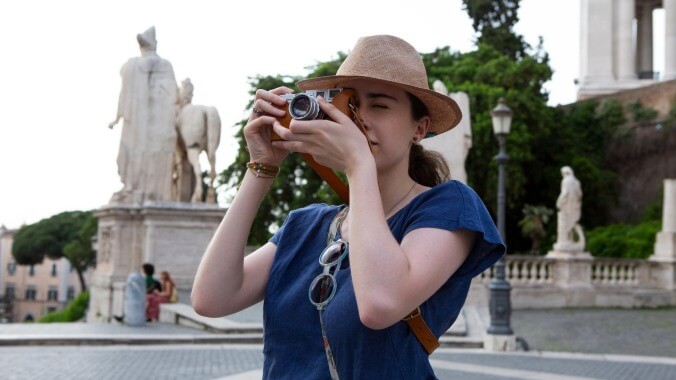Love & Gelato is sweet but unsatisfying
Brandon Camp's idealized travelogue of teenage awakening falls short of expectations

Love & Gelato trades so comfortably in telegraphed teenage emotional response triggers, lifted from the likes of Emily in Paris and countless other tales of young American protagonists dropped into exotic locations, that its creative impetus is chiefly a preordained, algorithmic green light. Adapted from Jenna Evans Welch’s 2016 young adult novel of the same name, writer-director Brandon Camp’s self-selecting romantic coming-of-age tale is a glossy, toothless idealization of older teenage awakening made for younger, less discerning adolescent audiences that, even within that stipulated realm, falls considerably short.
Love & Gelato centers on Lina Emerson (Susanna Skaggs) who, after graduating from high school, acquiesces to the dying wish of her terminally ill mother (an uncredited Robin Tunney, shown only in photos) by traveling to Rome prior to starting college. This journey is meant to retrace the footsteps of an eye-opening trip her mother took around the same age (which, not so incidentally, led to Lina’s birth), and assist in Lina finding herself, and perhaps even her biological father.
Lina’s hosts for this excursion are two family friends, Francesca (Valentina Lodovini) and Howard (Owen McDonnell), the former of whom provides Lina with an old diary in which her mother recounts her experiences. Almost immediately upon getting situated, Lina finds herself in the company of two boys: Alessandro Albani (Saul Nanni), a restless and impulsive scion set to head to Harvard in the fall, and Lorenzo Ferrazza (Tobia De Angelis), an aspiring culinary student. Lina’s best friend Addie (Anjelika Washington) plays matchmaker, first from afar and then in person, goading Lina into pushing herself outside of her comfort zone.
Love & Gelato is basically the professional equivalent of a work-study program, the type of movie which affords young actors the opportunity to cut their teeth on uncomplicated material within the well-manicured confines of an easily prescribed genre. If Nanni adequately exudes pin-up-type smoldering, De Angelis (who seems to be cosplaying as Albert Brooks from Broadcast News) provides sensitive counterbalance. Together, these young Italian performers lend Love & Gelato a certain cultural authenticity, and check the box for contrast—two different flavors of puppy-dog masculinity to momentarily distract Lina from other considerations.
A personable young performer who’s logged episodic credits on Halt And Catch Fire and Mr. Mercedes, Skaggs offers a bit more—even if the film itself doesn’t really give her much with which to work. She succeeds, in fleeting moments, in communicating an actual inner life for her character, and if Skaggs sometimes wanders painfully too far into exaggerated nervousness, it seems less catastrophic than merely a misdirected effort to bring some type of differentiating energy to a movie which is otherwise tonally quite flat.
Camp, whose previous credits include Love Happens and 2018’s Benji (a reboot of the popular canine film series originated and directed by his father Joe Camp), oversees a modestly successful technical package. The film isn’t at all visually ambitious, but makes effective use of some music cues and local scenery. The problem here (or at least one of them) is that the script is only sporadically meant to be taken seriously. A viewer is meant to somehow find funny Addie’s endless boundary-crossing (creating and updating phony social media profiles in her friend’s name), but also invest in a paternal search that feels entirely inert.
Welch’s novel is utterly empty fantasy, funneling self-actualization through needlessly complicated, poorly motivated plotting. (Two nominal sequels explore different characters in other countries, further exposing the tomes as wan travelogues.) But plenty of good movies are born of simplistic books. Camp, though, makes no effort to either deepen or moor its core conceit—in fact, he makes it dumber. This shortcoming is most roundly evident in how Lina interacts with her mother’s diary, using it as occasional prop rather than a surprising gift to be devoured and processed with increasingly illuminated introspection.
Additionally, a couple characters appear seemingly only out of some obligational fidelity to the source material, yet are presented in garish and jarring (as with an air-quote girlfriend of Lorenzo, who pops up in one scene to sow conflict) or reductive fashion. The smarter play would have been to ditch these characters entirely, and attempt to locate narrative tension in a different manner.
If there’s a dollop of praise to apply, it’s that the movie is credibly bilingual, and doesn’t present its protagonist is unduly flustered or overwhelmed by the “foreignness” of her surroundings. That seems perhaps a small thing (and in some respects is), but characters being rendered completely dumb or functionally paralyzed by having to interact with someone of a different culture is a tired trope, and Love & Gelato thankfully avoids this. If only its otherwise familiar flavors were crafted with more elevated skill, this movie might connect as the treat it wishes to be.